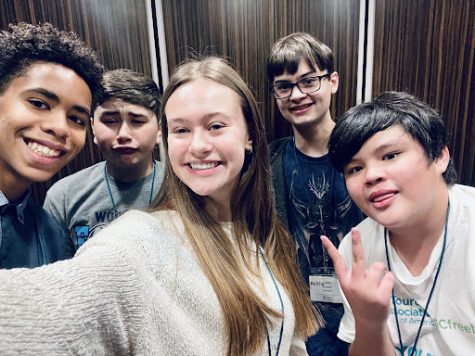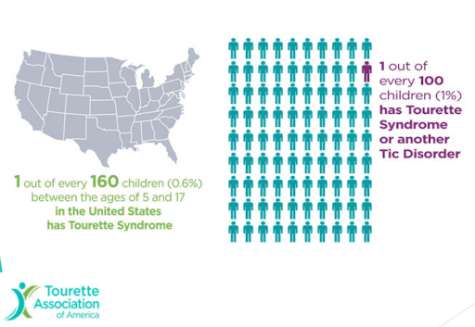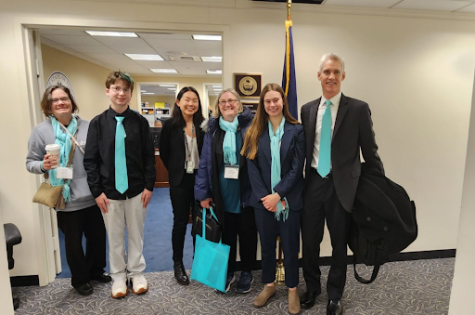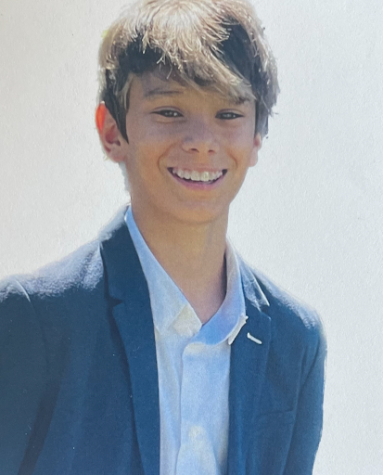Tourette Syndrome Through Teenage Eyes

May 17, 2023
A cacophony filled the high-ceilinged conference room; grunts, screams, song lyrics and even animal noises were audible from all directions. Dozens of people were jumping, waving and making strange faces. Every so often, a particularly loud comment or wail triggered the attention of all in the room. It was chaotic, yes. But for us, it was normal.

Welcome to the Tourette Association of America’s 2023 Youth Ambassador training in Washington, D.C. I was one of the over sixty teens chosen by the Tourette Association to advocate for tic disorders at the United States Capitol in March. We came from all over the country, from Pennsylvania to California to Hawaii, but we all had one thing in common: a diagnosis of Tourette syndrome.
Impacting roughly 1 in 160 school-aged Americans and 52,600 Pennsylvanian youth, Tourette syndrome (TS) involves symptoms called tics, which are involuntary motions or sounds. Two categories of tics exist in TS patients; simple and complex. Simple tics are often mild, like excessive blinking or a small persistent cough. But complex tics have the potential to wreak havoc on the lives of those with TS. The tics can manifest as noticeable movements and full phrases.

Tourette syndrome is a neurodevelopmental disorder, meaning that it is not transmissible. As of right now, it is not preventable (or curable), either. In order to receive a TS diagnosis, patients must exhibit at least two motor tics concurrently with one vocal tic for a year or longer, all before the age of 18.
Preteens and teens with Tourette are at the point in their lives when their tics are most severe. They’re also trying to navigate academics, relationships, and discovering their own identities – just like their peers. In March, when I met other teens like me with TS for the first time, I gained a new perspective on how the disorder truly impacts young people. Living with TS presents innumerable challenges, difficult interactions, and even a few positives.
May 15th to June 15th is Tourette Syndrome Awareness Month. Now more than ever, it’s important to recognize the diverse experiences of teens with TS. A stigmatized disorder, Tourette syndrome often makes young individuals feel ashamed of who they are. That’s why I wanted to share the stories of Tourette syndrome from all the wonderful people I met; I want the world to see TS from a teenage perspective.

When a person with Tourette syndrome is young, their tics often evolve, wax and wane. Seemingly overnight, a quiet throat-clearing tic can transform into a loud, painful grunt. Factors like stress, excitement, depression or even exhaustion can trigger changes in tics, so unpredictability often infiltrates the lives of those with Tourette.
Greta W., a sixteen-year-old from Minnesota, had her first tics when she was ten years old, a common age for the onset of Tourette. The tics were mild, however, and not that bothersome. That is, until two years ago.
“It wasn’t until I was 14 years old that my tics changed dramatically,” says Greta. “I went from having very minimal tics to having hundreds of various tics every day.”
Greta says that this severity-shift changed her life. Embarrassment from noticeable movements and noises hurt her at school, and bullying became yet another challenge she was forced to navigate.
Unfortunately, bullying is an all-too-common experience for kids and teens with Tourette syndrome. At the Tourette Association’s Youth Ambassador training, almost everyone I met had been a victim of bullying at some point. In fact, studies show that 56% of American children with Tourette syndrome have been bullied, compared to only 21% of children without TS.

Another teen, Daniel R. from Virginia, has been bullied for his tics, as well. According to Daniel, “When I’m in class, especially when it’s quiet, I will grunt, and kids will start to stare at me and laugh.” His anxiety often holds him back from explaining his TS to others, which only exacerbates the poor treatment.
Even outside the walls of American schools, teens with TS are often singled out in public for their unusual, yet uncontrollable, behavior. Sixteen-year-old Aurie H. from Pennsylvania once received glares from an adult in a Walmart, who eventually stormed out of the store. This situation made Aurie feel ashamed of their Tourette, despite the fact that their tics were completely involuntary.
Teens with TS are often afraid to explain their condition, for fear of misunderstanding and further ridicule. In the media, Tourette is almost always represented as excessive swearing or obscene gestures. Inappropriate tics do exist, in a sub-category of TS known as coprolalia. Coprolalia is quite rare, however, impacting about one in ten individuals with tics. Shows like South Park paint the picture that Tourette syndrome involves coprolalia and nothing more.

Annaliese A., a teen from Colorado, has tried to explain her disorder to others. Unfortunately, says Annaliese, “Most of the people I tell actually don’t know much about Tourette other than the stereotypes portrayed in the media.” She notes that people typically have an idea that TS only involves extremely elaborate, indecent, attention-catching tics. Because her tics are on the milder side, many of her peers don’t believe she has TS at all!
For those whose Tourette syndrome does involve coprolalia and tics that appear intentional on the outside, making it through a day at school or a walk in public can be socially excruciating. Sixteen-year-old Caleb G. from Georgia first developed swearing tics in fifth grade, and eventually, they became much more severe.
“Over my time in middle school, I was suspended repeatedly and nearly expelled due to my coprolalia,” said Caleb.
Stereotypes about coprolalia, and about TS in general, are unimaginably harmful to those who live with the disorder every day. These misconceptions must be replaced with education and understanding, which is currently lacking.
Not only does the general public frequently misunderstand Tourette syndrome – doctors are often unaware of the different presentations of the condition. This lack of understanding can, unfortunately, lengthen the diagnosis process for those with TS and delay appropriate treatments, such as medication and therapy.
“After years of testing, misdiagnoses, and being ignored by doctors, I finally got a diagnosis of TS in November 2018,” states Chelsea F. of North Carolina. The CDC reports that the average length of time between someone’s first tics and their Tourette diagnosis is two years. Many people with TS either go under the radar of their physicians, or they are misdiagnosed with another condition.
Obtaining a Tourette diagnosis is a pivotal step in a person’s journey with tics; it can help someone to understand their struggles better, thus providing much-needed clarity. Shawna P., a teen from Ohio, says that her diagnosis “helped me understand and gain access to support regarding my tics, which I had been having for years [before my diagnosis].” Sadly, 50% of the teens in the US estimated to have TS are undiagnosed.
Living with Tourette syndrome is not easy – I hope I’ve made that clear. When I met all the wonderful individuals whose stories I have included in this article, I could see the pain in their eyes as they delved into detail about bullying. I could see the embarrassment that surrounded them like clouds of smoke whenever they had particularly loud tics. I could tell how exhausted they were with society’s stereotypes and ignorance towards TS.
But, as the saying goes, what doesn’t kill you makes you stronger – an expression that could not be more applicable to teens with Tourette syndrome.
Resilience was a word that came up often during the Youth Ambassador training. It’s a character trait that involves getting knocked down, wiping the blood from your nose and rising to your feet again. Teens with Tourette syndrome across America have learned resilience through overcoming all the challenges and obstacles that have been placed on their paths.
Greta W. says that she likes to view her tics as a superpower, of sorts. Sometimes, her funny noises make others smile and laugh. She has taken the reins of her Tourette syndrome and used it as a gateway to making friends.
Daniel R. wishes to build more confidence and tell his story with Tourette. He wants to be able to tell his peers why he behaves the way he does, and he wants to do it with his chin held high. This goal has driven him to practice public speaking, so he can advocate not only for himself, but for others who are too nervous.

Aurie H. wants to spread awareness of Tourette syndrome in their rural community. Over the years, they have become more comfortable with ticcing in public, regardless of what others think.

Annaliese A. collaborated with her school to develop a 504 plan, guaranteeing her access to educational accommodations. She hopes to help kids like her succeed in the classroom.
Caleb G. has recently adopted a service dog named Hallie to help him manage his severe tics. He has committed to training Hallie and creating a lasting partnership with his canine friend.
Shawna P. became determined to end ignorance about Tourette syndrome. She busts stereotypes about her disorder whenever they come up, spreading truthful information on TS.
There’s one more story of resilience that I want to highlight. This is the story of Grady M., a fifteen-year-old from New York, who experienced his first tics at age nine while playing flag football. The day was strangely cold and wet, considering it was June. But he was on a winning streak with his best friends – what could go wrong?

Then, Grady started to feel the urge to make facial grimaces and grunting sounds. He felt embarrassed and confused. He describes that day as one of the worst of his life.
“All I knew was that I did not have control of my body, and things were only getting worse.”
Grady was diagnosed with Tourette syndrome soon after his first tics. Wishing to regain control of his body, he began cognitive therapy. There, he learned breathing techniques and competing responses to help lessen the severity of his tics. Remember; no current treatment can eliminate tics entirely. But Grady worked hard in therapy, and the effort paid off.
Throughout the years, he also learned how to communicate about his Tourette syndrome to others. According to Grady, “telling them [about TS] helped me realize that I was not on an island of my own and gave me so much hope that I could live with TS and not be so different from everyone else.”
As Grady grew up, his Tourette symptoms improved, a common phenomenon among the TS population. He still has tics, like eye blinking and hand clenching, but he has learned an important lesson – acceptance.
“I have accepted that TS is a part of me, and even a great part of me. It has given me a unique perspective and empathy…I wouldn’t trade who I am to get rid of my tics in a million years. Looking back on my journey and the uphill battles I have faced and overcome, I know that I am moving forward at breakneck speed.”
Through trials, tribulations and endless tics, Grady has turned an unlucky neurobiological circumstance into something positive. If that’s not resilience, then I don’t know what is.
Thousands of American teens impacted by Tourette syndrome have persevered through the obstacle course of having a nervous system that works against them. As someone with Tourette, I have had to emerge on the other side of low self-esteem and all the awful things that come with tics. I’ve had to sit in therapy offices and fight the urge to jump or repeat words. I’ve had to swallow pills and hope my symptoms subside. But like Grady and every other teen I met this past March, my experience with TS has crafted my character. It’s made me stronger.
Do I like Tourette? No. I would cure the disorder in a heartbeat if I could. However, it would do a great disservice to the TS community if I failed to recognize how our experiences have given us the advantage of resilience.
This Tourette Syndrome Awareness Month, I urge you to learn more about TS and the 1 in 160 American youth it affects. Please take a minute or two to check out some of the links at the bottom of this article. It’s a small gesture that means a lot to those with this condition.
Statistically, there are at least eight students here at RHS with tics, myself included. That might not sound like many, but by learning about Tourette syndrome, you have the chance to be more empathetic when you see someone behaving in a way you don’t understand.
Awareness is critical, especially for a stigmatized disorder like this. You can help stop the problem of stereotypes and bullying. And while awareness isn’t quite the same as full acceptance and understanding, it’s a start. And it’s a pretty good one.
More Information Links:
- Tourette Syndrome Overview: https://tourette.org/about-tourette/overview/
- Tourette Diagnosis: https://tourette.org/about-tourette/overview/diagnosis/medical-diagnosis/
- Tourette Association Youth Ambassador Program (where I met everyone featured in this article): https://tourette.org/about-tourette/overview/living-tourette-syndrome/teens-13-17/youth-ambassador-program/
- “Living with Tourette” Short Documentary:







